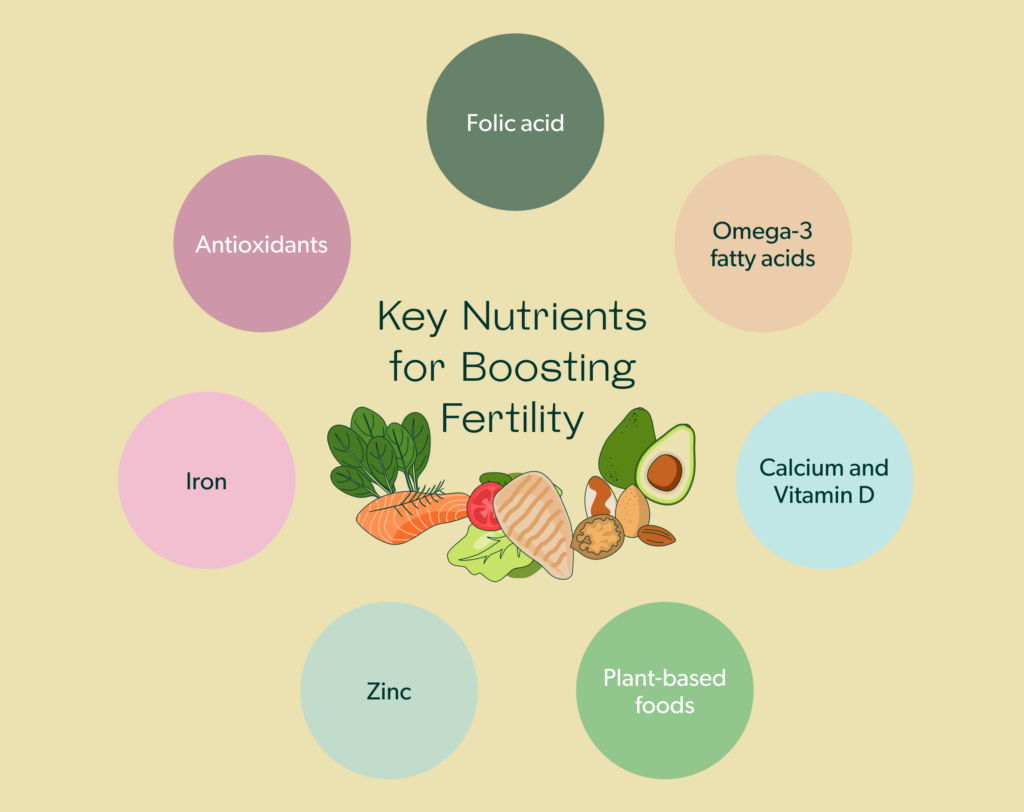7 Best Foods to Increase Fertility
When it comes to planning a pregnancy, nutrition and fertility go hand in hand. A balanced diet not only helps us maintain a healthy weight, but it can also help to keep our fertility hormones regulated – not to mention the fact that certain nutrients are scientifically proven to improve the chances of conception.

In this article, we’ll cover everything you need to know about fertility and nutrition. We’ll start with an overview of the nutrients essential for fertility and conclude with a list of seven different types of foods you can start incorporating into your diet today!
Ready? Let’s go!
Fertility and Nutrition
Our diet impacts our fertility in a few different ways. For starters, eating a balanced, nutrient-rich diet helps us maintain a healthy weight – which improves our overall chances of getting pregnant. This is backed up by multiple research studies that show being over (or under) weight can prevent ovulation – a necessary component of conception.
Specific nutrients are also known to have a positive impact on an individual’s ability to get pregnant. For example, researchers at Harvard published a study linking folic acid, vitamin B12, and omega-3 fatty acids to improved fertility. These nutrients can be consumed in the form of supplements as well as absorbed through certain foods such as leafy green vegetables, lean meats, fish, dairy products, nuts, and seeds.
It’s important to note that nutrition isn’t the only piece of the fertility puzzle. Other lifestyle factors such as stress, sleep, substance use/abuse, and the use of certain medications can all have an impact on hormone balance, which in turn can interfere with an individual’s ability to conceive in any given cycle. Curious about your own hormone patterns? You can track up to four different fertility hormones with the Mira App and Monitor!

To learn more about the relationship between our lifestyle and hormone health, check out our article 13 Ways to Balance Hormones Naturally (Lifestyle Guide).
Key Nutrients for Boosting Fertility
So which nutrients should we focus on to improve our chances of conception? What foods can improve female egg quality? Here are our top picks from the medical team!
Folic acid
Folic acid (aka vitamin B9) is an essential nutrient for fertility and early pregnancy. In addition to promoting healthy cell growth and preventing birth defects, research also suggests that folic acid may help to regulate progesterone levels. According to the Mayo Clinic, folic acid can also promote good heart health and mitigate symptoms of depression.
Foods that are high in folic acid include leafy green vegetables, fruits, beans, nuts, and enriched grains.
Omega-3 fatty acids
Omega-3 fatty acids have a number of different health benefits. In terms of fertility, a diet rich in omega-3s is associated with improved egg quality, enhanced sperm count, and improved sperm motility. During pregnancy, omega-3s are known to help support early fetal development and prevent perinatal depression.
Foods that are rich in omega-3s include salmon, tuna, mackerel, chia seeds, flaxseed, walnuts, and soybeans.
Antioxidants
According to the American Pregnancy Association, certain toxins and stressors (also known as “free radicals” or “oxidative stress”) in our day-to-day lives can be harmful to fertility. For example, parabens, pesticides, psychological stress, excess caffeine, and excess sugar are known to contribute to oxidative stress – which in turn increases the risk of infertility and even miscarriage.
To help combat the negative effects of oxidative stress, antioxidants can be consumed in food or as part of a supplement. If you are planning a pregnancy now or sometime in the future, the best way to get plenty of antioxidants is by taking a prenatal vitamin.
In addition to a prenatal vitamin, you should also aim to consume foods that are rich in antioxidants – such as fruits and vegetables, nuts and seeds, fish, lean meats, chickpeas, and lentils.

Iron
Iron is another nutrient that promotes optimal fertility. Iron not only keeps our energy levels high, but research also suggests that iron may help to lower the risk of ovulatory infertility among women. In men, balancing iron levels is key, as levels that are too high or too low may lead to male infertility and/or sexual dysfunction.
Foods that are high in iron include beef, chicken, tuna, beans, whole grains, nuts and seeds, spinach, and tofu.
Zinc
Zinc is another key nutrient for our reproductive health. In terms of female fertility, research shows that zinc plays a role in several reproductive processes including egg maturation, fertilization, implantation and fetal development. Research also suggests that low zinc levels may have a negative effect on egg development.
Foods that are high in zinc include oysters, beef, pumpkin seeds, cheese, Greek yogurt, peanuts, and lentils.
Calcium and Vitamin D
We all know that calcium and vitamin D are essential nutrients for bone health. But in terms of fertility, research suggests that the consumption of dairy products high in calcium and vitamin D may be associated with a decreased risk of endometriosis. Vitamin D is also thought to help regulate reproductive processes in both men and women.
Foods that are high in calcium include yogurt, milk, soy milk, almond milk, cheese, spinach, kale, salmon, and tofu. Foods that are high in vitamin D include salmon, tuna, eggs, mushrooms, milk, soy milk, yogurt, and cheese.
Plant-based foods
There is limited research into the specific relationship between plant-based diets and fertility outcomes. However, generally speaking, plant-based diets can help us maintain a healthy weight. This in turn improves our chances of conception. Plant-based foods are also likely to be more nutrient-rich compared to processed foods, helping to set the body up for reproductive success.
A plant-based diet doesn’t necessarily mean being vegetarian or vegan. It simply means that foods from plant sources are consistently prioritized for meals and snacks. In practice, this can look like adding more fruits and vegetables to your meals, swapping out meat or dairy for a plant-based alternative, and/or trying to incorporate more vegetarian/vegan meals each week.
There are dozens of plant-based recipe ideas available on the internet to suit your tastes and dietary requirements. A few recipes that we love are the Best Buddha Bowl from Love & Lemons, Lentil Bolognese from Feasting at Home, and the Cauliflower Tacos from Bon Appétit.
7 Best Fertility Boosting Foods
Now that we’ve given a rundown of all the different nutrients that help promote fertility, here’s a list of the top seven fertility foods that can be incorporated into your weekly meal planning.
- Spinach: Packed with iron, calcium, and vitamin D, spinach is a powerful ingredient to add to salads, soups, and sauces.
- Berries: High in antioxidants, berries work great as a topper on oatmeal, cereal, or yogurt. They can also be a standalone snack or dessert.
- Salmon: High in calcium, vitamin D, and omega-3s, fatty fish like salmon, tuna, and mackerel are safe to consume at least twice per week.
- Lean meats: Opt for lean cuts of meat such as chicken breast, sirloin steak, and pork tenderloin for a boost of iron, zinc, and antioxidants.
- Whole grains: Carbohydrates help us feel energized and satiated – but make sure to always opt for whole grains or “enriched” grains that are packed with fiber, protein, and vitamins.
- Nuts & seeds: You can’t beat the crunch of an almond, walnut, or pumpkin seed in a salad or as a snack. Nuts and seeds are also often packed with omega-3s, antioxidants, iron, and zinc.
- Dairy: Dairy products such as eggs, milk, yogurt, and cheese not only help us feel full after a meal, but they are also an excellent source of calcium and vitamin D.
It’s important to note that there is no single food or food group that can magically help you get pregnant overnight. Instead, try to focus on maintaining a balanced diet that incorporates a range of different foods proven to have a positive impact on overall health and fertility.
FAQs
Can food really impact fertility?
Yes. The foods we consume can have a direct impact on our fertility.
For example, the overconsumption of foods that are high in sugar, trans fats, and salt can contribute to weight gain, which in turn can have a negative impact on our ability to get pregnant.
On the other hand, nutrient-rich foods such as fruits, vegetables, lean meats, dairy products, nuts, seeds, and whole grains not only assist with weight management, but they also contain essential nutrients for reproductive health.
Which foods are known to boost fertility?
According to the Academy of Nutrition and Dietetics, the following foods in moderation are associated with a reduced risk of infertility.
- Monounsaturated fats – such as olive oil, avocados, nuts, and seeds
- Vegetable proteins – such as beans, broccoli, chickpeas, and lentils
- High-fiber foods – such as whole grains, high-fiber cereals, flax seeds, chia seeds, blackberries, and cauliflower
- High-fat dairy products – such as yogurt, cheese, and milk
Which foods increase sperm count?
According to the University of Chicago Medicine, there are four different types of foods that may improve sperm health. This includes fish, fruits, vegetables, and walnuts.
Are there any lifestyle factors that affect fertility?
Yes. Other lifestyle factors that can affect fertility include stress, sleep, substance use/abuse, exercise, and certain medications. If you are looking to plan a pregnancy, we recommend checking out this resource for building a fertility plan – it provides practical information on the relationship between lifestyle, hormones, and fertility.
If you are struggling to balance your lifestyle alongside planning a pregnancy, it’s worth seeking help from a fertility coach. Certified fertility coaches can help to improve your chances of conception by offering support in a range of areas – such as fertility charting, nutrition, balancing your hormones, mental health/wellness, and more.

A little extra support from an expert can go a long way
Book an online consultation with one of our Hormone Health Coaches.
Schedule NowMira’s Editorial Process
All content produced by Mira meets stringent editorial standards, ensuring excellence and accuracy in language and medical precision. Every piece undergoes thorough fact-checking and review by qualified professionals. Check out our full editorial process to learn more.










